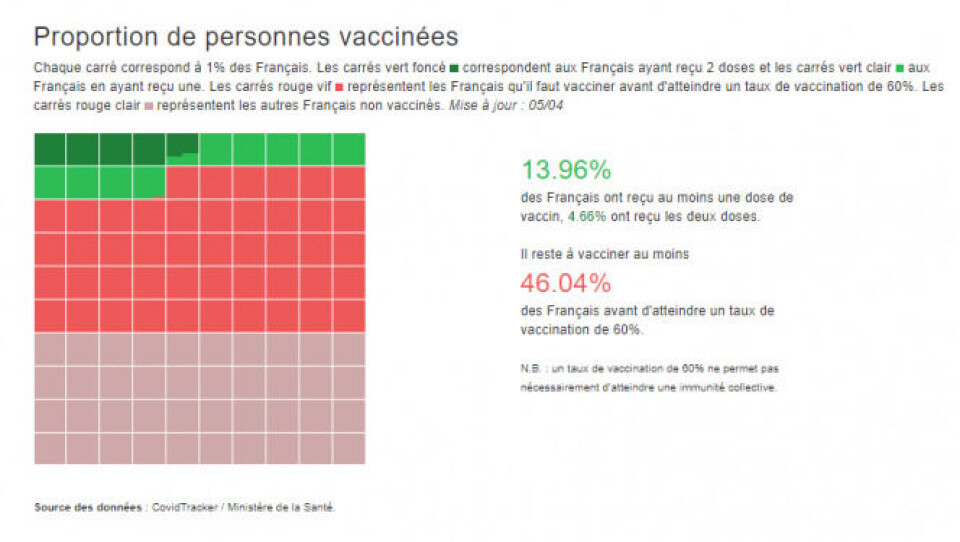-
Loire vineyard invites Taylor Swift to visit after documentary cameo
Disney+ documentary puts family vineyard in the international spotlight
-
39 bombs wash up on Gironde beach following World War Two bunker collapse
Shells were defused by experts but prefects warn others may remain
-
French airports request EES rollout suspension this summer
Risk of congestion feared if April full deployment of system for all eligible passengers takes place
When will life return to normal in France after Covid-19?
French research centre Institut Pasteur has looked into how the vaccination rollout could put an end to restrictions

All Covid-related restrictions will be able to be relaxed by this autumn in France if enough people are vaccinated, the Institut Pasteur has stated in a new report.
It stated that if the contagion rate of the virus has not changed from last year, then 90% of over 65s and 70% of 18-64s will need to be vaccinated for all restrictions to be dropped.
If variants of Covid-19, such as the UK variant which has spread widely in France, have increased the virus’ basic reproduction number (R number), as it is thought is the case, then the institute has predicted that it will be necessary for 90% of all adults to be vaccinated for measures to be relaxed completely by autumn.
The research institute published its outlook on the Covid-19 pandemic and the effects of France’s vaccination campaign in stemming it yesterday (April 6).
The researchers developed mathematical models to allow them to anticipate what vaccine coverage would be necessary in different age groups to allow the country to relax measures completely.
The French government is aiming to vaccinate all willing adults by the end of the summer. Its first goal of vaccinating 10 million people by the middle of April is on course to be achieved, with over 9.3 million people having already received a first dose.
Summary
Scenario one: Variants of Covid-19 do not increase the virus’ transmissibility above the rate it was during the first wave in spring 2020.
There can be zero Covid-related restrictions in France by the autumn if
- 90% of over 65s are vaccinated
- 70% of 18-64s are vaccinated
Scenario two: Variants of Covid-19 do increase the virus’s transmissibility above the 2020 rate.
There can be zero Covid-related restrictions in France by the autumn if
- 90% of all adults are vaccinated
Understanding the numbers
The calculations were based on a model vaccine
The researchers based their calculation on a model vaccine that could reduce the severity of the Covid-19 disease by 90% and reduce the transmission of the virus by 80%.
There are three vaccine types being used in France today - those of Pfizer-BioNTech, Moderna and AstraZeneca. A fourth, by Johnson & Johnson, is set to be rolled out later this month.
The researchers’ model vaccine reflects those being used currently in France.
A recent study in the US found that the Pfizer-BioNTech and Moderna vaccines reduce the transmission of the virus by 79% 10 days after receiving a first dose and 80% after receiving a second dose.
Another study carried out by the Israeli Health Ministry found the Pfizer-BioNTech vaccine reduces transmission of the virus by 89.4% in asymptomatic cases and up to 93.7% in symptomatic cases.
Both the Pfzer-BioNTech and Moderna vaccines have been found to be around 95% effective against Covid-19.
As for the AstraZeneca Covid vaccine, which is also being used in France, it has been found to be 76% effective and initial data provided by the company shows it to reduce transmission by 67% after one dose and 50% after two doses.
Hospitalisations key to relaxing measures
The researchers based their model of relaxing restrictions on the number of hospitalisations.
They stated that in order to have zero restrictions, the vaccines would have to be effective enough so that the transmission of the virus and its severity would not cause more than 1,000 hospitalisations per day.
Currently, an average of 1,852 people are being hospitalised each day in France due to Covid-19.
Impact of variants
The researchers carried out several hypothetical projections.
In one, they considered the virus’ basic reproduction number (R number) to be three. This means that for every one person who catches Covid-19, they will infect three others.
This was the case in France during the first lockdown between March and May 2020, shortly after the virus began spreading in Europe and before measures such as masks and social distancing were widely used.
In this example, scenario one, as outlined above, would be possible.
It is, though, probable that variants of the virus, such as the one first discovered in the UK, will mean the R number will increase.
One UK study found that the UK variant could increase the R number by between 0.4 to 0.7.
The researchers also made projections for what would happen in this instance, considering the R number to be four. In this case, scenario two, as outlined above, would be possible.
The reason that 90% of all adults would need to be vaccinated in this second scenario is because “a significant epidemic is still expected among children, contributing to the infection of unprotected parents and grandparents,” the report stated.
If it is found that vaccines are safe and effective on children, then the numbers could change.
France’s vaccination campaign progress
Just under 14% of France’s adult population has been vaccinated with one dose against Covid-19 so far. Just under 5% have received two doses.

To vaccinate the entire adult population in France (52 million people) by the end of August, it is necessary to inject an average of 576,266 doses per day, states CovidTracker, a website that offers visual data on the pandemic in France.
At the current rate of vaccinations, it would take a year for all adults in France to be vaccinated, so April 2022.
However, the vaccination campaign is accelerating, meaning this date is expected to change.
The government’s goals are to vaccinate 10 million people by mid-April, 20 million by mid-May, 30 million by the end of June and all willing adults by the end of the summer.
























